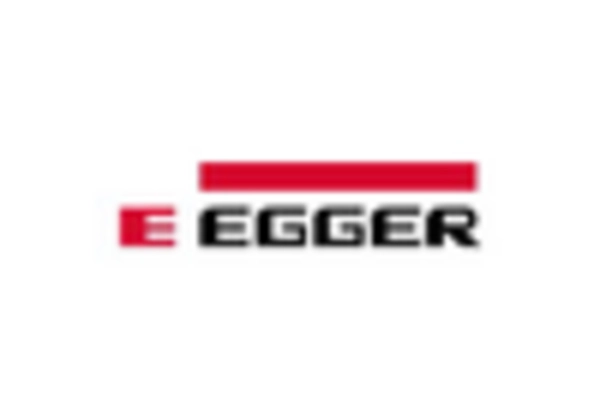Growth of the Furniture Industry
The furniture industry in China is experiencing robust growth, which is positively impacting the Wood-Based Panels Market. As disposable incomes rise and consumer preferences shift towards stylish and functional furniture, the demand for wood based-panels is expected to increase. In 2025, the furniture sector is projected to expand by approximately 6% annually, leading to a heightened need for various types of wood based-panels used in furniture production. This growth is likely to encourage manufacturers to innovate and diversify their product offerings, thereby enhancing the overall appeal of wood based-panels in the market. Additionally, the trend towards customization in furniture design may further drive demand for specialized wood based-panels.
Expansion of the Construction Sector
The construction sector in China is undergoing rapid expansion, which is significantly impacting the Wood-Based Panels Market. With urbanization continuing at a brisk pace, the demand for building materials, including wood based-panels, is on the rise. In 2025, the construction industry is projected to grow by approximately 5% annually, leading to an increased requirement for various types of panels used in residential and commercial buildings. This growth is further fueled by government initiatives aimed at improving infrastructure and housing availability. Consequently, the wood based-panels market is likely to benefit from this construction boom, as builders and architects increasingly opt for wood based-panels due to their versatility, aesthetic appeal, and sustainability.
Rising Demand for Eco-Friendly Products
The Wood-Based Panels Market in China is experiencing a notable increase in demand for eco-friendly products. This trend is largely driven by heightened consumer awareness regarding environmental sustainability. As a result, manufacturers are increasingly focusing on producing panels that utilize sustainable materials and processes. In 2025, it is estimated that the market for eco-friendly wood based-panels could account for approximately 30% of total sales, reflecting a significant shift in consumer preferences. This growing inclination towards green products is compelling companies to innovate and adapt their offerings, thereby enhancing their competitive edge in the wood based-panels market. Furthermore, government regulations promoting sustainable practices are likely to bolster this trend, encouraging manufacturers to invest in environmentally friendly technologies and materials.
Technological Innovations in Manufacturing
Technological advancements in manufacturing processes are playing a crucial role in shaping the Wood-Based Panels Market. Innovations such as automated production lines and advanced adhesives are enhancing the efficiency and quality of panel production. In 2025, it is anticipated that the adoption of these technologies could lead to a reduction in production costs by up to 15%, thereby making wood based-panels more competitive against alternative materials. Additionally, improved manufacturing techniques are enabling the production of panels with superior durability and performance characteristics. This trend is likely to attract a broader customer base, as both manufacturers and consumers seek high-quality, cost-effective solutions in the wood based-panels market.
Government Policies Supporting Sustainable Forestry
Government policies in China aimed at promoting sustainable forestry practices are significantly influencing the Wood-Based Panels Market. These policies encourage responsible sourcing of raw materials, which is essential for the long-term viability of the industry. In 2025, it is expected that compliance with these regulations will become increasingly stringent, compelling manufacturers to adopt sustainable practices. This shift not only helps in preserving forest resources but also enhances the marketability of wood based-panels as eco-friendly products. As a result, companies that align with these policies may gain a competitive advantage, appealing to environmentally conscious consumers and businesses alike.

















